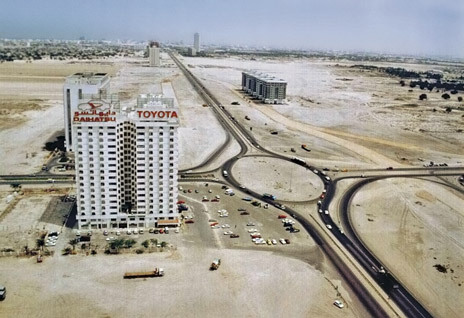From “The New Mecca,” George Saunders 2005 GQ article about Dubai before the worldwide recession slowed down (somewhat) that next-level nation-state’s otherworldly development if not its outlandish dreams:
IN WHICH I FALL IN LOVE WITH A FAKE TOWN
From the air, Dubai looked something like Dallas circa 1985: a vast expanse of one- or two-story white boxes, punctuated by clusters of freakish skyscrapers. (An Indian kid shouted, “Dad, looks like a microchip!”) Driving in from the airport, you’re struck by the usual first-night-in-new-country exotica (“There’s a Harley-Davidson dealership—right in the Middle East!“), and the skyscraper clusters were, okay, odd looking (like four or five architects had staged a weird-off, with unlimited funds)—but all in all, it was, you know, a city. And I wondered what all the fuss was about.
Then I got to my hotel.
The Madinat Jumeirah is, near as I can figure, a superresort consisting of three, or possibly six, luxury sub-hotels and two, or maybe three, clusters of luxury villas, spread out over about forty acres, or for all I know it was twelve sub-hotels and nine luxury-villa clusters—I really couldn’t tell, so seamless and extravagant and confusing was all the luxury. The Madinat is themed to resemble an ancient Arabian village. But to say the Madinat is themed doesn’t begin to express the intensity and opulence and areal extent of the theming. The site is crisscrossed by 2.3 miles of fake creeks, trolled night and day by dozens of fake Arabian water taxis (abras) piloted by what I can only describe as fake Arabs because, though dressed like old-timey Arabs, they are actually young, smiling, sweet-hearted guys from Nepal or Kenya or the Philippines, who speak terrific English as they pilot the soundless electrical abras through this lush, created Arabia, looking for someone to take back to the lobby, or to the largest outdoor pool in the Middle East, or over to Trader Vic’s, which is also themed and looks something like a mysterious ancient Casbah inexplicably filled with beautiful contemporary people.
And so, though my first response to elaborate Theming is often irony (Who did this? And why? Look at that modern exit sign over that eighteenth-century bedstead. Haw!), what I found during my stay at the Madinat is that irony is actually my first response to tepid, lame Theming. In the belly of radical Theming, my first response was to want to stay forever, bring my family over, set up shop in my hut-evoking villa, and never go home again.
Because the truth is, it’s beautiful. The air is perfumed, you hear fountains, the tinkling of bells, distant chanted prayers, and when the (real) Arabian moon comes up, yellow and attenuated, over a (fake) Arabian wind tower, you feel you are a resident of some ancient city—or rather, some ancient city if you had dreamed the ancient city, and the ancient city had been purged of all disease, death, and corruption, and you were a Founder/Elder of that city, much beloved by your Citizens, the Staff.
Wandering around one night, a little lost, I came to the realization that verisimilitude and pleasure are not causally related. How is this ‘fake’? This is real flowing water, the date and palm trees are real, the smell of incense and rose water is real. The staggering effect of the immense scale of one particular crosswalk—which joins two hotels together and is, if you can imagine this, a four-story ornate crosswalk that looks like it should have 10,000 cheering Imperial Troops clustered under it and an enigmatic young Princess waving from one of its arabesquey windows—that effect is real. You feel it in your gut and your legs. It makes you feel happy and heroic and a little breathless, in love anew with the world and its possibilities. You have somehow entered the landscape of a dream, the Platonic realization of the idea of Ancient Village—but there are real smells here, and when, a little dazzled, you mutter to yourself (“This is like a freaking dream, I love it, I, wow…”), you don’t wake up, but instead a smiling Filipino kid comes up and asks if you’d like a drink.
On the flight over, I watched an interview with an employee of Jumeirah International, the company that manages the Madinat. Even though he saw it going up himself, he said, he feels it is an ancient place every time he enters and finds it hard to believe that, three years ago, it was all just sand.•
Tags: George Saunders

